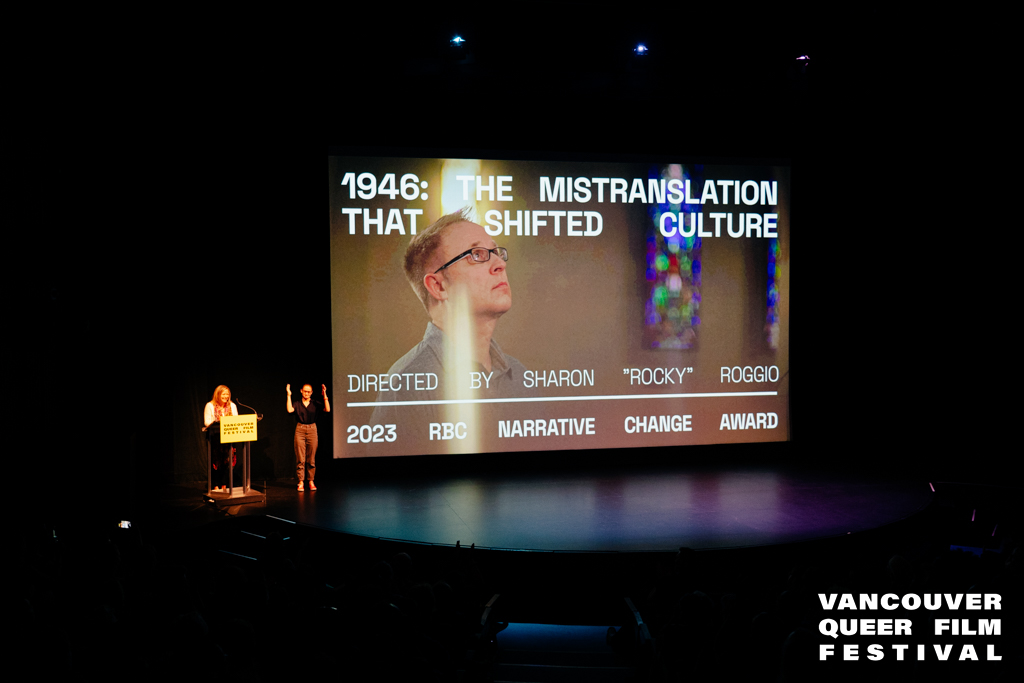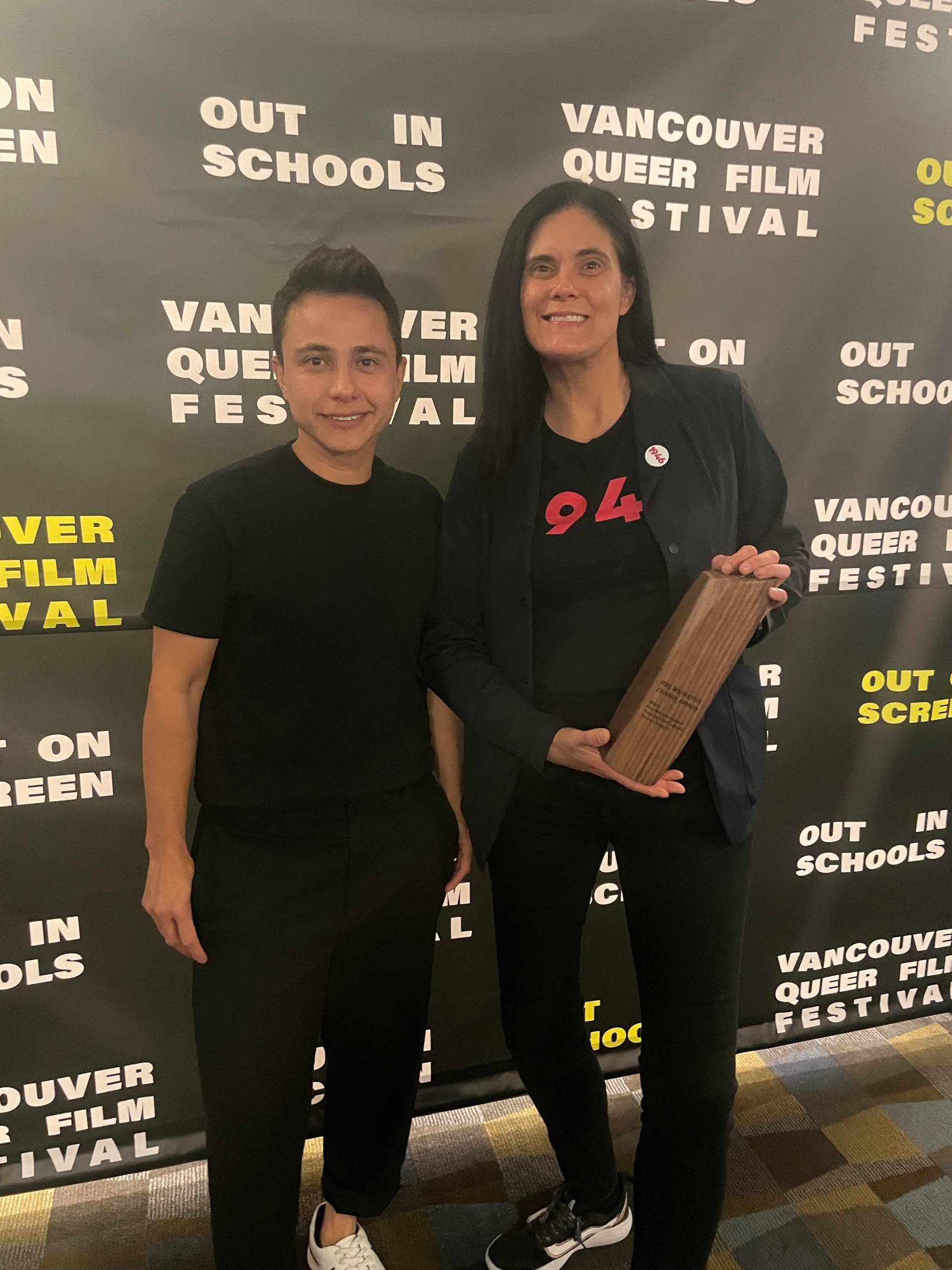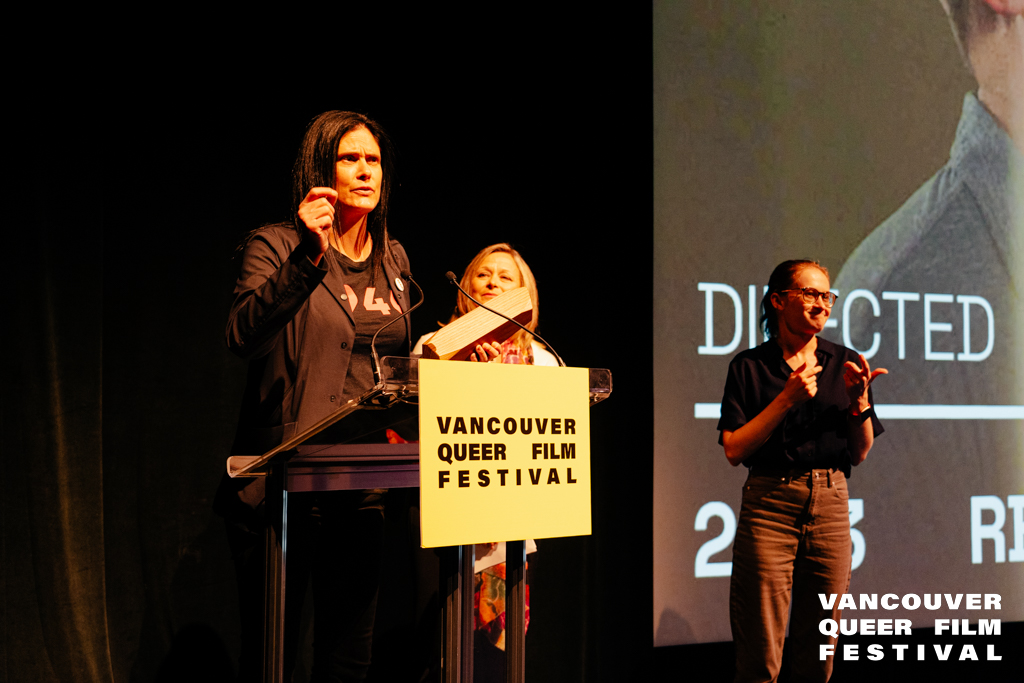Film festivals like the VQFF are vital to support filmmakers like Roggio to contribute to a more inclusive and diverse cultural landscape.
This article originally appeared on RBC News & Stories.
In the summer of 2018, filmmaker Sharon “Rocky” Roggio had begun investigating the topic of her next project — promoting acceptance for 2SLGBTQIA+ people — when she found herself in a meeting that would change her life.
“I’d been trying to find a way to communicate with my non-affirming parents pretty much my whole life,” Roggio recalls. “Being a person who grew up in the church and also being an 2SLGBTQIA+ identifying person, those two worlds don’t always align.”
Her research led her to author and advocate Kathy Baldock, a leading expert on 2SLGBTQIA+ issues in the United States. When Roggio discovered that Baldock would be in Los Angeles at the same time as her parents, she saw an opportunity. “Let’s get everyone in the room and just start filming.”
That meeting is now part of Roggio’s directorial debut, the documentary 1946: The Mistranslation That Shifted Culture.

The inaugural RBC Narrative Change Award
1946 was selected for the inaugural RBC Narrative Change Award at the Vancouver Queer Film Festival (VQFF), a yearly British Columbia-wide film festival that “illuminates transformative moments in the lives of queer, trans, and Two Spirit people.” RBC is proud to be the award’s sponsor to inspire change and expand the perception of 2SLGBTQIA+ identities.
“VQFF aims to inspire 2SLGBTQIA+ storytellers to reclaim the cinematic canon. The RBC Narrative Change Award honours and celebrates filmmakers like Roggio, who use their craft to disarm harmful stereotypes, liberate our community, and reshape culture,” says Charlie Hidalgo, Artistic Director of Out On Screen which organizes the Festival.
“Our media is saturated with simplistic and repetitive stories of adversity and resilience,” Hidalgo says. “These narratives exacerbate our communities’ challenges because they focus on the experience of trauma rather than on the people, institutions or policies that continue to harm us.”
Film festivals like the VQFF are vital in promoting representation, visibility, education, community building, and empowerment within the 2SLGBTQIA+ community and beyond. They recognize and help support filmmakers like Roggio to contribute to a more inclusive and diverse cultural landscape.
When it comes to support, in her director’s statement, Roggio highlights the shoestring beginnings of the production. “What started off with a few cameras at a conference with a nonexistent budget has absolutely blossomed into a movement that I could not have foreseen. Today, 1946 has an established dedicated team of volunteers who’ve contributed their time, money, and efforts to bring this film to the world. We’ve received major donations from individuals, private organizations, churches and crowd funding. The production has been 100 per cent bootstrapped through private donations.”

Charlie Hidalgo and Sharon “Rocky” Roggio at this year’s VQFF.
Q&A with filmmaker Sharon “Rocky” Roggio
Q: First of all, congratulations. The jury was looking for work that challenges outdated ideas about 2SLGBTQIA+ people. I think it’s fair to say that’s a good mission statement for this film. What is the central idea in 1946?
Roggio: 1946 examines how the word homosexual appeared in the Bible in major translations and the implications of this on the real world. Baldock was the first one to ask, “Who put the word homosexual in the Bible, and why?”
Q: According to Baldock’s research, that word doesn’t appear until 1946, and it’s a mistranslation. Take me through the moment when you understood that. What went through your head?
Roggio: I was like, “Wait, what?”
I was on this journey, trying to find affirming ground. A lot of these issues are interpretations, and this is a historical document. Maybe humans can make mistakes and have enough dignity and awareness to take a step back and really look at this because people’s lives are at stake.
As a filmmaker, I felt it was important to get this information out into the world. That’s the origin story. As a filmmaker, a pastor’s daughter, and a lesbian, I might have been accidentally, unknowingly preparing for this my entire life.
Q: As a filmmaker, you’re a storyteller. Why are stories so important to the LGBTQIA+ community?
Roggio: Representation is so important for everyone. As we see in the film, at five years old, I saw something in the media that told me two women were in a relationship. I knew what that was … but I didn’t know what that was. I can only imagine growing up now and seeing 2SLGBTQIA+ characters where you know it’s okay and their friends are accepting them. I think that’s wonderful.
Q: What kind of audience feedback are you getting?
Roggio: People who see the film are very excited by the work and we’ve received audience awards in numerous cities. The reception has been amazing.
There was a person who spoke in front of the crowd at a Q&A and was bold enough to say that she felt guilt from some of her behaviour toward her gay brother. Those moments are really powerful.
Q: What’s next for you?
Roggio: The RBC Narrative Change Award will help me to continue the work that I do.
Right now we’re working on an Oscar-qualifying run and that will be followed by some sort of release. After that, we’ll implement our impact campaign, which includes a workbook that will help answer some of the top questions and also a resource guide to find affirming spaces, recommend books to read, and so on. This will open us up to make the film available for licensing in educational institutions and churches.
I believe this film can help shift our culture back toward love and inclusion, equality and understanding globally. We need to be able to discuss these things, and the goal is to provide tools for that.

This article is intended as general information only and is not to be relied upon as constituting legal, financial or other professional advice. A professional advisor should be consulted regarding your specific situation. Information presented is believed to be factual and up-to-date but we do not guarantee its accuracy and it should not be regarded as a complete analysis of the subjects discussed. All expressions of opinion reflect the judgment of the authors as of the date of publication and are subject to change. No endorsement of any third parties or their advice, opinions, information, products or services is expressly given or implied by Royal Bank of Canada or any of its affiliates.

